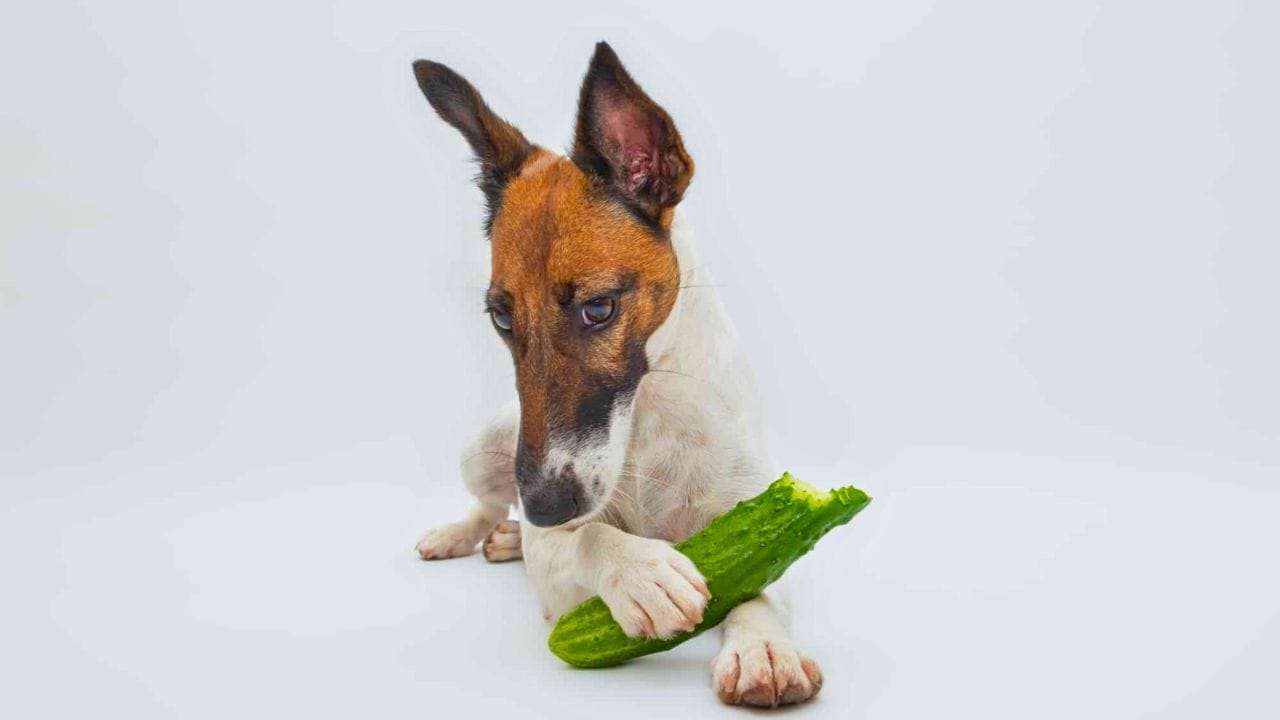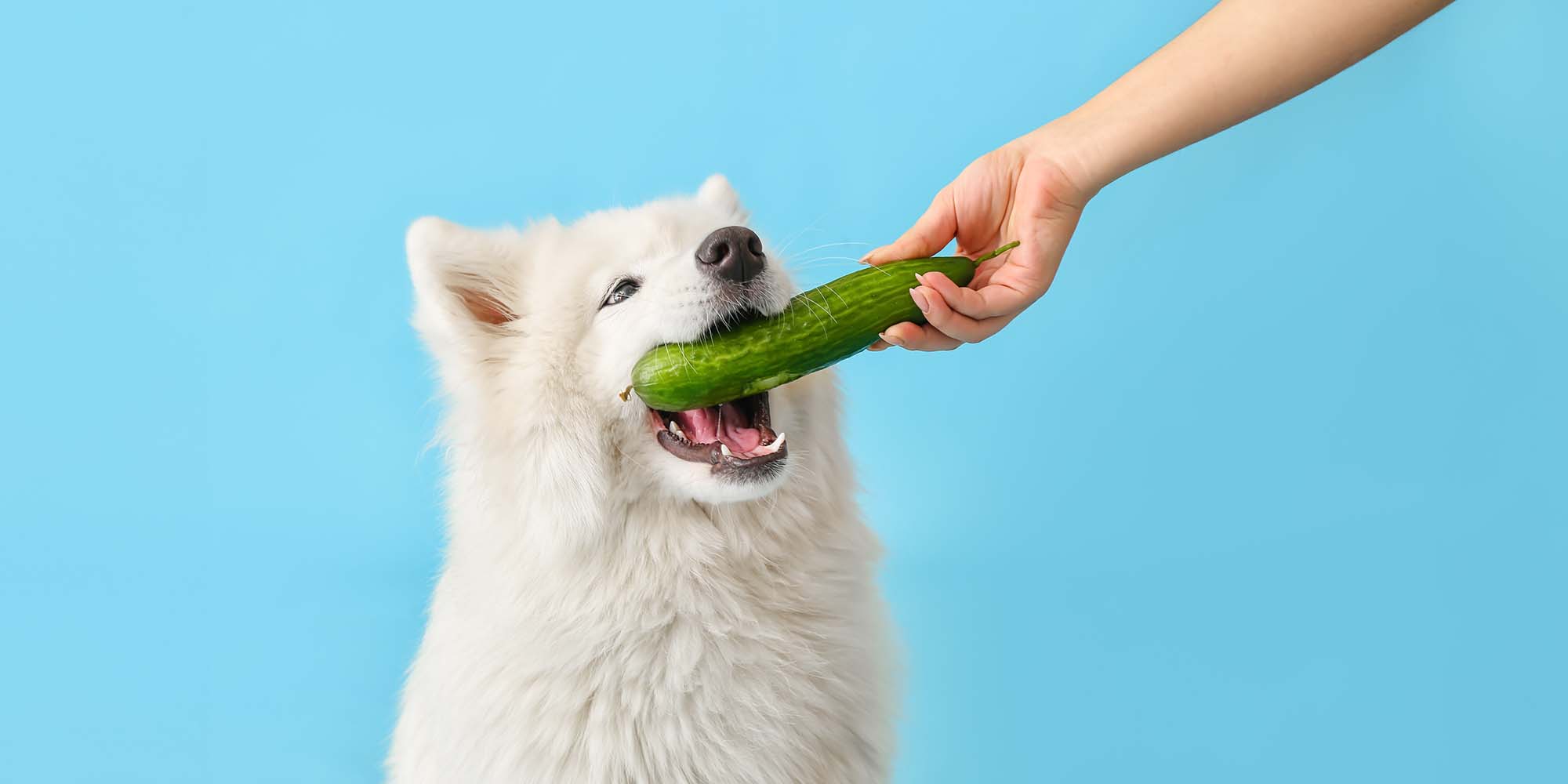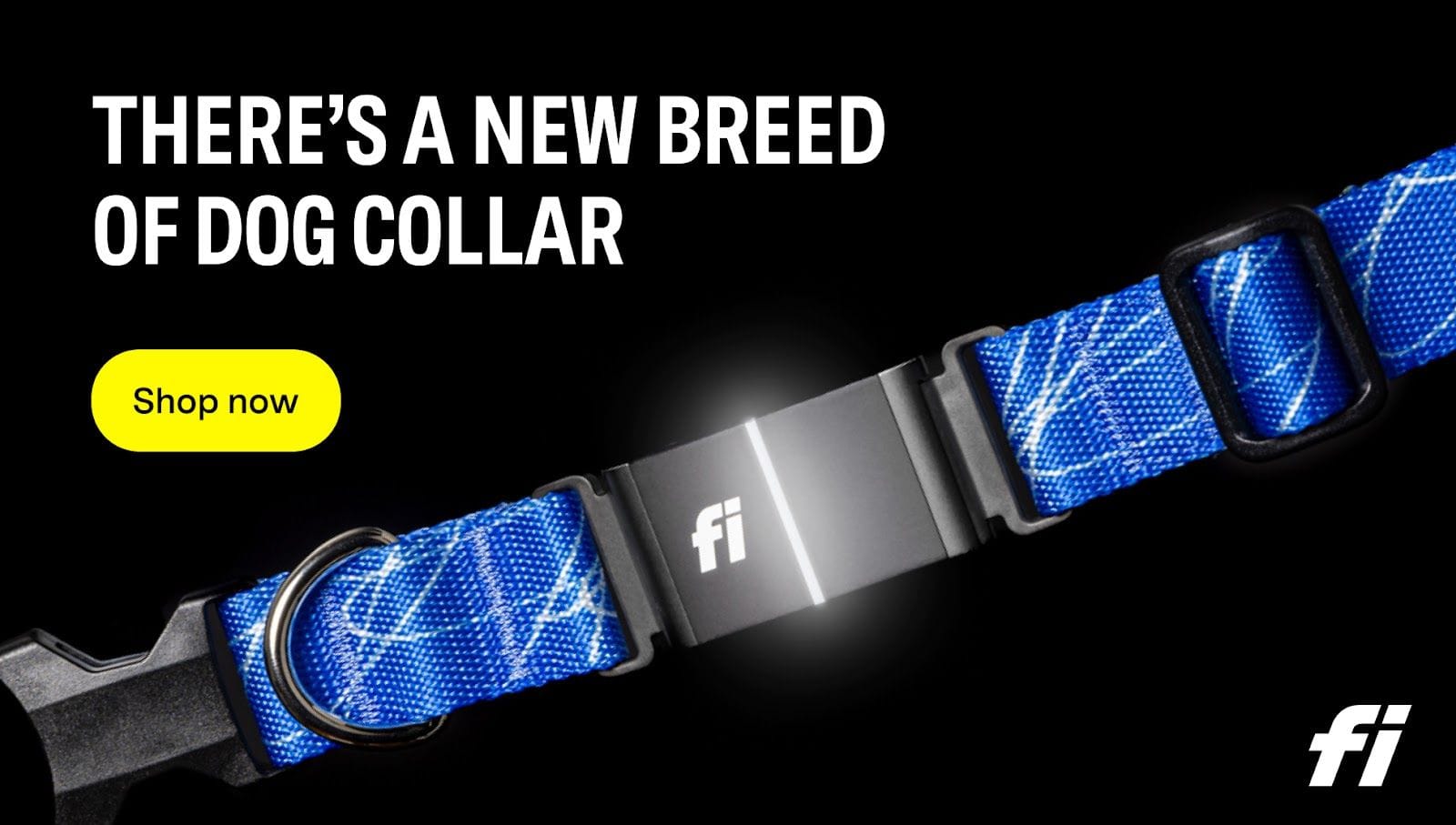Dogs are known for their love of food, and their curious nature often leads them to try new things. As a result, dog owners may wonder if it's safe to give their furry friend certain human foods, such as cucumbers. The answer is yes, dogs can have cucumbers, but there are some things to keep in mind.

Cucumbers are a low-calorie, hydrating vegetable that can be a healthy snack for both humans and dogs. They are rich in vitamins and minerals, such as vitamin K and potassium, which can benefit a dog's overall health. However, it's important to note that while cucumbers are safe for dogs to eat, they should be given in moderation and prepared in the right way.
Benefits of Cucumbers for Dogs
Cucumbers are a healthy and low-calorie treat that can be a great addition to your dog's diet. They are packed with vitamins and minerals that provide various health benefits to your furry friend. Here are some of the benefits of cucumbers for dogs:
Hydration and High Water Content
Cucumbers are mostly made up of water, which makes them an excellent source of hydration for your dog. It is important to keep your dog hydrated, especially during hot weather or after exercise. Cucumbers can be a refreshing treat that helps your dog stay hydrated and cool.

Low-Calorie Treat for Weight Management
Cucumbers are low in calories and high in fiber, which makes them an ideal treat for dogs that are trying to lose weight or maintain a healthy weight. They can be a great alternative to high-calorie treats that can contribute to weight gain in dogs.
Vitamins and Minerals in Cucumbers
Cucumbers are rich in vitamins and minerals that provide various health benefits to your dog. They contain vitamin K, which helps with blood clotting and bone health. They also contain vitamin C, which is an antioxidant that helps boost the immune system. In addition, cucumbers are a good source of potassium and magnesium, which are essential for heart health and muscle function.
In summary, cucumbers are a healthy and nutritious treat that can provide various health benefits to your dog. They are low in calories, high in fiber, and packed with vitamins and minerals that promote overall health and wellbeing. However, it is important to feed cucumbers in moderation and avoid giving them to dogs with certain health conditions.
How to Safely Feed Cucumbers to Dogs
Cucumbers are a safe and healthy treat for dogs, but it's important to feed them in the right way to avoid any digestive problems. Here are some tips on how to safely feed cucumbers to your furry friend.
Proper Size and Preparation
When serving cucumbers to dogs, it's important to slice them into small pieces to avoid any choking hazards. It's also recommended to remove the seeds from the cucumber, as they can be difficult to digest and may cause stomach upset.
Before serving the cucumber, make sure it is washed thoroughly to remove any dirt or pesticides that may be present on the skin. Slicing the cucumber also makes it easier for the dog to digest and absorb the nutrients.
Introducing Cucumbers as a New Food
If your dog has never had cucumbers before, it's important to introduce them slowly and in small amounts. This will allow their digestive system to adjust to the new food and prevent any upset stomachs.
Start by offering a small slice of cucumber as a treat and monitor your dog's reaction. If they enjoy it and show no signs of digestive discomfort, you can gradually increase the serving size.
Overall, cucumbers can be a healthy and tasty addition to your dog's diet when served in the right way. Just remember to slice them into small pieces, remove the seeds, and introduce them slowly as a new food.
Risks of Feeding Cucumbers to Dogs
While cucumbers can be a healthy and refreshing snack for humans, it is important to exercise caution when feeding them to dogs. Here are some risks associated with feeding cucumbers to dogs:
Choking Hazards and Digestive Concerns
Cucumbers can pose a choking hazard to dogs, especially if they are not cut into small pieces. Dogs may also have difficulty digesting cucumbers, which can lead to diarrhea, vomiting, and gastrointestinal upset. It is recommended to peel and remove the seeds from cucumbers before feeding them to dogs to reduce the risk of digestive problems.
Toxic Ingredients to Avoid
While cucumbers themselves are not toxic to dogs, it is important to avoid feeding them pickles or any cucumber-based products that contain onions, garlic, salt, or sugar. These ingredients can be harmful to dogs and may cause a range of health issues, including anemia, vomiting, and diarrhea. Additionally, xylitol, a common sweetener in some pickles and other cucumber-based products, can be toxic to dogs and should be avoided at all costs.
If a dog exhibits any signs of choking, vomiting, or diarrhea after eating cucumbers, it is important to seek veterinary care immediately. Veterinarians can provide treatment and advice on how to safely feed cucumbers to dogs in the future.

Cucumbers in a Dog's Diet
Cucumbers are a healthy and low-calorie snack that can be included in a dog's diet. They are a good source of hydration, fiber, and vitamins. However, it is important to keep in mind that dogs have different nutritional needs than humans, and not all human foods are safe for dogs to consume.
Moderation and Balance
While cucumbers are a healthy snack option for dogs, it is important to feed them in moderation and balance. Too much of anything can be harmful, and overeating can lead to obesity and weight management issues. Dogs should always have a well-balanced diet that includes all the essential nutrients needed for their growth and development.
Dietary Guidelines and Portion Control
When feeding cucumbers to dogs, it is important to follow dietary guidelines and portion control. Cucumbers should be cut into small bite-sized pieces to prevent choking hazards. It is also important to remove the seeds as they can cause digestive issues.
Cucumbers can be given as a treat or added to their regular meals. However, it is important to keep in mind that treats should not make up more than 10% of a dog's daily caloric intake.
In conclusion, cucumbers can be a healthy addition to a dog's diet when fed in moderation and balance. Always consult with a veterinarian before making any changes to your dog's diet, and remember to follow dietary guidelines and portion control to ensure your dog's health and well-being.
Frequently Asked Questions
Can Dogs Eat Cucumber Seeds or Skin?
Yes, dogs can eat cucumber seeds and skin. However, it is important to note that cucumber skin can be tough to digest and may cause digestive upset in some dogs. Therefore, it is recommended to peel the cucumber before feeding it to your furry friend. Additionally, cucumber seeds are not harmful to dogs, but they can be a choking hazard if not properly chewed.
Are Pickled Cucumbers Safe for Dogs?
Pickled cucumbers, also known as pickles, are not recommended for dogs. This is because pickles contain high amounts of sodium, which can be harmful to dogs, especially those with underlying health conditions such as kidney disease or high blood pressure. Additionally, pickles often contain other ingredients such as garlic and onion, which are toxic to dogs.
How Often Can Dogs Have Cucumbers?
Cucumbers can be a healthy treat for dogs when given in moderation. It is important to note that cucumbers should not be the main source of nutrition for dogs and should only be given as a snack. The frequency of feeding cucumbers to your dog will depend on their age, size, and overall health. As a general rule, it is recommended to feed cucumbers to dogs no more than once or twice a week.
In conclusion, cucumbers can be a healthy snack for dogs when given in moderation. However, it is important to peel the cucumber and remove the seeds to prevent any digestive issues. Additionally, pickled cucumbers should be avoided due to their high sodium content. As with any new food, it is recommended to introduce cucumbers slowly and in small amounts to ensure that your dog tolerates them well.
Alternative Healthy Treats for Dogs
Dogs love treats, and as a responsible pet owner, it's essential to provide them with healthy options. Here are some alternatives to traditional dog treats that are both healthy and delicious.
Vegetable and Fruit Options
Vegetables and fruits are an excellent source of vitamins and minerals for dogs. Some dog-safe fruits include apples, bananas, blueberries, strawberries, and watermelon. Vegetables like carrots, green beans, sweet potatoes, and pumpkin are also great options.
It's essential to remember that not all fruits and vegetables are safe for dogs. Grapes, raisins, onions, and garlic are toxic to dogs and should be avoided. Also, it's best to remove any seeds, stems, or pits from fruits before feeding them to your dog.

Commercial Dog-Safe Treats
If you prefer to buy commercial dog treats, choose those made with natural ingredients and without any harmful additives or preservatives. Look for treats that contain peanut butter, cream cheese, or other dog-safe fruits and vegetables.
When shopping for dog treats, it's essential to read the labels carefully. Avoid treats that contain artificial colors, flavors, or sweeteners. Also, keep in mind that some dogs may have allergies or sensitivities to certain ingredients, such as grains or chicken.
In conclusion, there are many healthy treat options for dogs whether you prefer to make them at home or buy them from the store. By providing your dog with healthy treats, you are not only rewarding them but also contributing to their overall well-being.
Conclusion
In conclusion, cucumbers emerge as a nutritious and hydrating snack option for dogs, offering a plethora of health benefits including hydration, weight management, and essential vitamins and minerals. However, it's crucial to serve them in moderation and with proper preparation to avoid any potential risks such as choking hazards and digestive issues. While cucumbers can be a healthy addition to a dog's diet, it's important to remember that they should not replace a balanced diet tailored to a dog's specific nutritional needs.
As with introducing any new food, it's advisable to start with small amounts and observe your dog's reaction. For those seeking variety, there are numerous other healthy treat alternatives like certain fruits and vegetables, as well as high-quality commercial treats made from natural ingredients. Ultimately, ensuring the well-being of your furry friend involves offering a diverse diet within safe and healthy boundaries, and always consulting with a veterinarian before making significant changes to their diet.